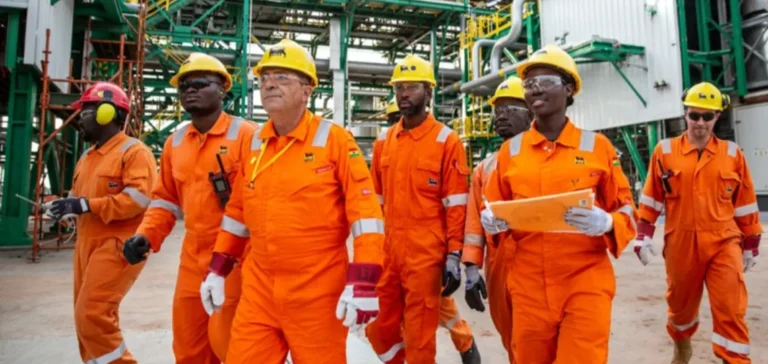Enilive, Eni’s biofuels division, reports an adjusted quarterly EBITDA of €233 million, up 35% driven by margin normalization. European spreads for Hydrotreated Vegetable Oil (huile végétale hydrotraitée, HVO) based on Used Cooking Oil (huiles de cuisson usagées, UCO) reach $1,143/t, versus $613/t previously, an increase of 86%. United States spreads for Renewable Diesel (diesel renouvelable, RD) stand at $420/t, down 45% year on year amid a more abundant supply backdrop. Processed volumes total 315 kilotons for the quarter (+14%), with a utilization factor of 85% versus 74% previously, and a nine-month total of 881 kilotons, down from 952 kilotons due to planned outages.
Italian conversions: Livorno, Sannazzaro and Priolo
The Livorno conversion is backed by €500 million financing from the European Investment Bank (Banque européenne d’investissement, EIB) with a biogenic pretreatment unit and a 500 kilotons per year Ecofining capacity for hydrotreated fuels. The industrial setup targets stabilization of heterogeneous feedstock quality and improved yields in the Hydroprocessed Esters and Fatty Acids (esters et acides gras hydrotraités, HEFA) process. Product flexibility allows switching between road HVO and Sustainable Aviation Fuel (carburant d’aviation durable, SAF) according to price signals.
Sannazzaro de’ Burgondi plans conversion of existing units with integrated waste/residue pretreatment and a 550 kilotons per year capacity target. This configuration aims for higher tolerance to feedstock variability and reduced losses upstream of hydrotreating. Priolo adds a biorefinery of about 500 kilotons per year, pretreatment and hydrogen production, complemented by chemical recycling of about 40 kilotons per year using Versalis technology. Phased execution leverages Gela and Venice–Porto Marghera to anchor operating continuity.
International anchors: Korea, Malaysia and U.S. diversification
In South Korea, the joint venture between LG Chem and Enilive advances an installation of roughly 400 kilotons per year dedicated to HVO/SAF, targeting industrial start-up mid-decade. The location leverages established petrochemical ecosystems and corridors adapted to renewable fuel flows. In Malaysia, a project under development complements the Asia axis to expand regional coverage and open export capacity compatible with certification schemes recognized in Europe. These hubs stagger start-ups to limit simultaneous supply entry and smooth ramp-ups.
In the United States, the Louisiana asset provides additional exposure to regional RD margin differentials. This exposure diversifies flows when one market tightens and helps absorb spread variations. Coordination of maintenance windows, start-ups and hydrogen availability remains a lever for operational stability. Standardization of processing trains facilitates replication of best practices across regions.
Market, prices and demand signals
Ester product references show daily adjustments: FAME 0 is quoted at $650.25/t, RME at $714.75/t and UCOME at $812.25/t, down about 5.38%, 3.7% and 5.41% respectively on the last session. These moves indicate short-term pressure on ester segments while maintaining differentials favorable to HEFA chains. The European ReFuelEU Aviation mandate sets SAF blending at 2%, then 6% and 70% on successive horizons, providing a constrained demand trajectory for aviation. The Renewable Energy Directive (directive sur les énergies renouvelables, RED) governs the use of waste and residues, conditioning volume eligibility and project bankability.
The rise of multi-feedstock pretreatment aims to secure the integrity of UCO and animal fats streams and to stabilize downstream yields. Aviation offtake contracts now embed clauses on quality, carbon intensity and remediation in case of non-compliance. Reinforced controls on certain feedstock origins can alter procurement costs and trigger basket re-allocation between UCO and animal fats. The ability to document compliance and process performance remains a determinant of access to premia and mandate-backed volumes.
Aggregate capacity, guidance and execution
Target biorefining capacity reaches 1.65 million tons per year in the near term, with an additional 1 million tons per year under construction. Enilive’s guidance targets an adjusted pro forma EBITDA of about €1 billion for the year, supported by normalized European spreads and product flexibility. The Italy–Asia–United States footprint spreads the investment curve and smooths utilization ramp-ups. Permitting, construction and start-up milestones condition the capture of price differentials.
The installed base at Gela, Venice–Porto Marghera and Louisiana supports flows during conversion and expansion phases. Integration of hydrogen units and management of catalysts and planned maintenance contribute to operating stability. Sensitivity to feedstock costs remains the main short-term variable. The evolution of HVO–UCO spreads and premia linked to compliance schemes will steer product allocation between HVO and SAF.






















